Australian state may stop religious schools from anti-gay discrimination
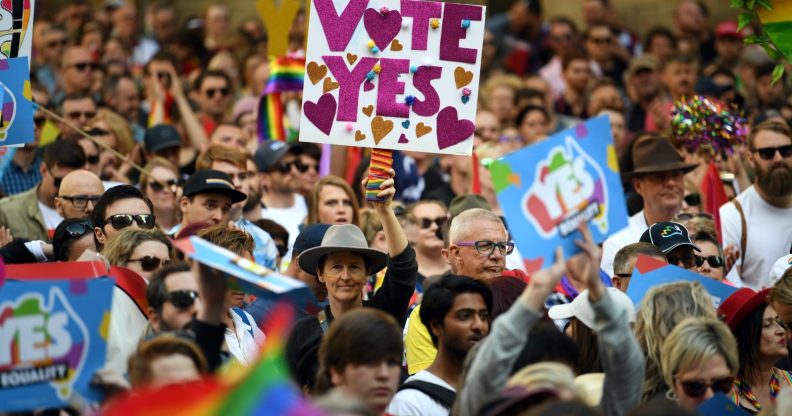
Australia legalised same-sex marriage last year (Getty)
Western Australia is considering whether to stop religious schools from being able to discriminate against LGBT+ people.
As the ballots closed in a plebiscite on whether Australians should be about to enter same-sex marriages, the state faced questions about religious schools.
The state government is seeking legal advice on the issue.
It is expected that same-sex marriage will be legalised following the plebsicite, and the LGBT community is seeking an anti-gay “loophole” to be closed.
A letter to Western Australian Premier Mark McGowan sees LGBT rights advocates argue that the loophole should be closed saying it is being used to target LGBT+ students and teachers.
“In other mainland States, exemptions for religious schools are often defined only to apply to staff members whose job has a specific religious purpose,” Same-Sex Parents Association spokeswoman Maxine Drake told the Western Australian.
“WA’s extraordinary loophole for church schools is so wide and poorly written, it even allows students to be expelled if they have gay parents.”
It gives examples, such as a 2015 case where a 7-year-old girl was removed from the Mandurah’s Foundation Christian College.
Her gay father was told that she must never discuss his sexuality.
“The principal of the school was noted as saying at that time, ‘If I’d known she had gay dads, I would never have enrolled her’,” the letter adds.
Millions of voters have been returning their ballots for weeks in the country’s non-binding postal vote on LGBT rights.
An incredible 78% of eligible Australians have cast their vote – a bigger turnout than in the UK’s Brexit referendum.
The vote has no legal basis, however, and will merely inform MPs when the issue is permitted to go before Parliament.
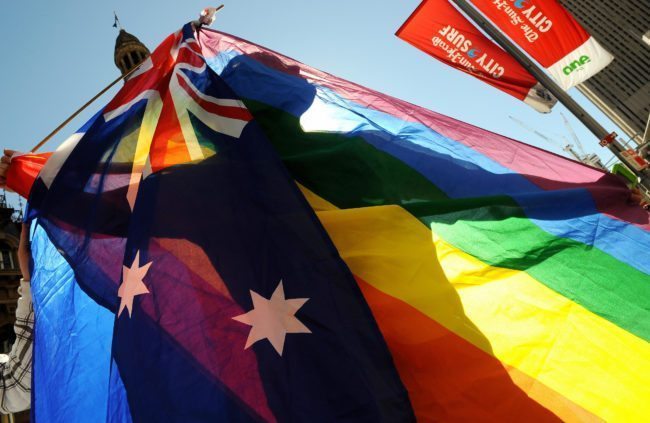
(TORSTEN BLACKWOOD/AFP/Getty Images)
The deadline for returning ballots by post has now passed, meaning voters yet to have their say must return their survey in person.
Voters can deliver forms to drop-off centres run by the Australian Bureau of Statistics (ABS), the organisation running the national same-sex marriage survey.
Drop-off centres are open until 4.30pm across Australia, except Melbourne, which is closed for the Melbourne Cup public holiday.
Polls predict that around 60% of the 12 million Australians who have voted have backed the Yes campaign.
The gap between the two campaigns has narrowed in recent weeks, with previous polls putting Yes on as much as 66%.
All public polls conducted since ballots were first issued have shown Yes in the lead, with LGBT activists expected to be victorious when the result is announced on 15 November.
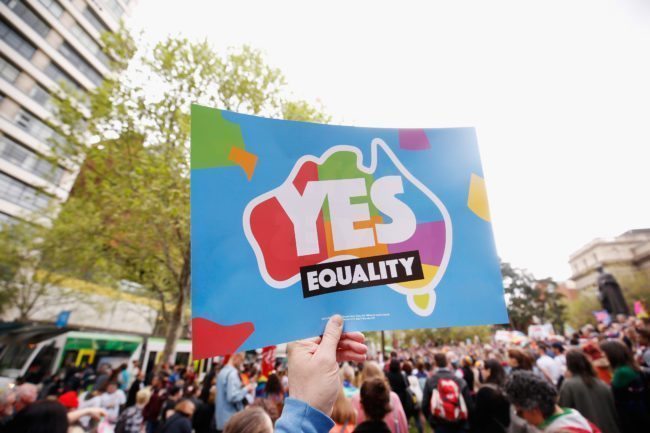
Speaking to Sky News, Tiernan Brady of the Equality Campaign said he believed equality campaigners have “confidently won the argument.
“I think the Australian people have seen through it… I think the public have made their mind up.”
However a victory in the national postal ballot might not mean any laws are changed in Australia.
The ballot is only advisory, leaving decisions on whether to change marriage law to Australia’s government.
Prime Minister Malcolm Turnbull supports same-sex marriage, but many in his right-wing government are opposed to the move.
He has previously said that same-sex couples could be married by the end of the 2018 if the plebiscite is affirmative, but experts conclude this is unlikely.
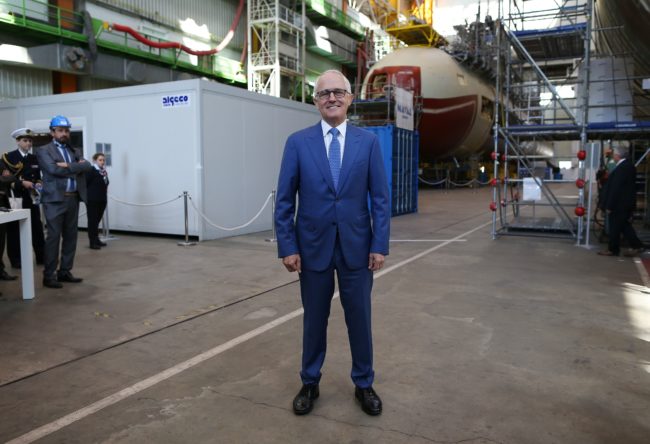
Australian Prime Minister Malcolm Turnbull
Hardline anti-LGBT MPs within the governing Liberal-National Coalition will not be conceding, even if the public gives a strong backing for equality.
Instead, they will attempt to table a string of amendments to the eventual marriage bill.
The government has indicated that it would give its backing to a backbench marriage equality bill if there is a clear victory for Yes.
But a group of hardline conservative politicians are plotting a rebellion – and may provoke a split in PM Turnbull’s party if they are not granted a string of concessions.
Anti-LGBT Senator Eric Abetz, a strong opponent of equal marriage and the government’s former Senate leader, this week said he would back amendments seeking “freedom to discriminate” loopholes, which equality activists say would undermine LGBT rights protections.
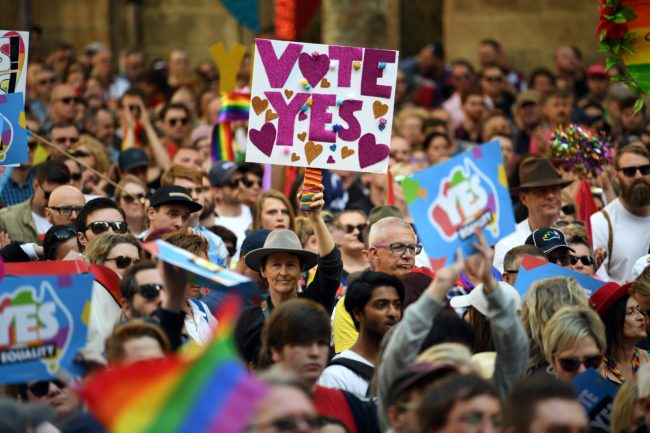
Speaking to the West Australian, he said: “[The bill] is seriously inadequate, as parents, freedom of speech and religious freedom, along with conscientious objection, all need full protection.”
The group could drown the legislation in amendments.
According to the newspaper, sources say that between 60 and 100 amendments could be filed, which would stall progress on the issue.
Senator Smith warned that Parliament should not allow the legislation to be passed if it is amended to undermine discrimination protections.
He said: “If there is a Yes vote, it will be necessary for the opponents of marriage to detail their amendments.
“This will provide a challenge to the Liberal Party because the community will not accept any winding back of Australia’s well-established anti-discrimination laws.”
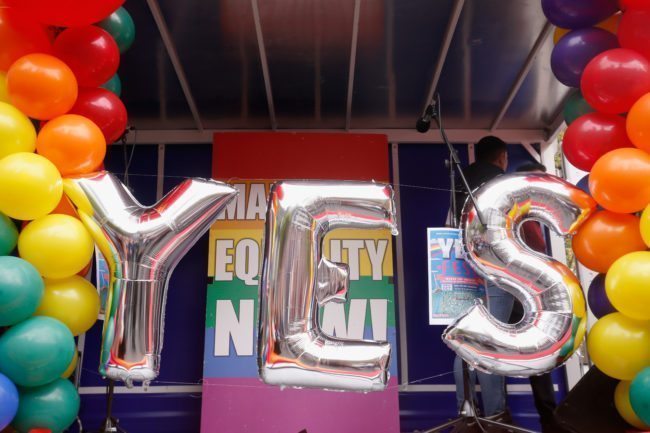
The Coalition, led by Prime Minister Malcolm Turnbull, is deeply divided on equal marriage.
The Nationals and a powerful right-wing faction of the Liberals – including prominent members of Turnbull’s Cabinet – are strongly opposed to equal marriage, while centrists and the youth wing of the Liberals are in favour of reform.
The public vote was only called by Turnbull as a compromise between the two groups after MPs began openly discussing a leadership challenge or rebellion against him.
However, punting the issue to the public does not mean that the rift has gone away, and the bill is likely to run into extreme difficulties in Parliament.

